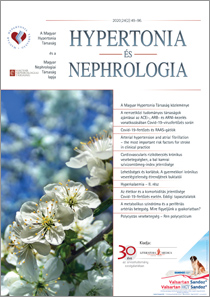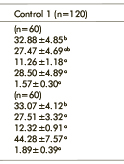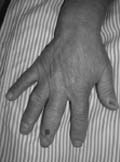Az eLitMed.hu orvostudományi portál a böngészés tökéletesítése érdekében cookie-kat használ.
Ha bővebb információkat szeretne kapni a cookie-k használatáról és arról, hogyan módosíthatja a beállításokat, kattintson ide: Tájékoztató az eLitMed.hu Cookie-használatáról.
Részletes keresés
Kérjük, állítsa be a paramétereket!
Találatok száma: 28
Arterial hypertension and atrial fibrillation - the most important risk factors for stroke in clinical practice
Vascular stroke is a very frequent cause of morbidity and mortality, and in patients who suffered stroke subsequent long-term neurological deficit of greater or lesser extent is an important factor. Numerous clinical and epidemiological studies confirmed that elevated systemic blood pressure is among the main risk factors of both ischemic and hemorrhagic vascular stroke, the effects of arterial hypertension being very complex including morphological and functional changes in vessels and vascular circulation. In our retrospective analysis of 218 patients hospitalized for stroke we found arterial hypertension in 91.2% of subjects and atrial fibrillation in 32.1% of subjects. 182 patients (83.5%) have been diagnosed with ischemic stroke and 36 patients (16.5%) with hemorrhagic stroke. In the group of patients with atrial fibrillation, only 33 patients (47.1%) were treated by anticoagulants, what points out an inadequate indication of anticoagulant treatment when considering the stroke risk calculation for atrial fibrillation (CHA2DS2- VASc Score) and bleeding risk (HAS-BLED Calculator for Atrial Fibrillation). It is also noteworthy that in the group of patients with anticoagulant therapy who have developed ischemic stroke in spite of this treatment, we found that in 48.5% the treatment was underdosed and therefore ineffective. Our work points to the need to improve the effective management of arterial hypertension and atrial fibrillation, the most common modifiable factors of vascular strokes.
[A sarcopenia és a dynapenia prevalenciája a különböző stádiumú Alzheimer-típusú dementiában szenvedő betegek körében ]
[Cél - A vizsgálat célja a sarcopenia és a dynapenia prevalenciájának megállapítása a különböző stádiumú Alzheimer-típusú dementiában (AD) szenvedő betegek körében, továbbá adatgyűjtés annak érdekében, hogy javaslatokat tehessünk a betegségteher csökkentése érdekében.]
Hírvilág
2015. JANUÁR 12.
Elhunyt Pásztor Emil Széchenyi-díjas idegsebész
Életének 89. évében elhunyt Pásztor Emil Széchenyi-díjas idegsebész, egyetemi tanár, a Magyar Tudományos Akadémia rendes tagja.
Protektív vegyületek a trigeminusaktiváció és a neurodegeneráció állatmodelljeiben
Neurological diseases are disorders, which primarily involve the nervous system and the treatment pose a great challenge. In some of these disorders, there are only functional changes in the nervous system, but there are diseases where there is a progressive cell death in the pathomechanism. Sometimes the functional and morphological disorders coexist and distinguishing them can be difficult. In the present work we chose to examine migraine, a disorder with functional abnormalities and Huntington’s disease (HD) which involves neurodegeneration.
Rude Radical Reductionism - Ede Frecska's reflection on Neuromania
This rudely radical reductionism is not a characteristic of the neuroscientific field only. A behavioral psychologist would state that you are not more than a package of adaptive behavioral patterns, a radical social psychologist would say that you are not more than the sum of social roles, or a classical psychoanalyst would suppose that you are a bunch of complexes. Richard Dawkins has moved in another direction stating that we are vessels of selfish genes.
Hírvilág
2011. AUGUSZTUS 15.
Szerepkonfliktusok megnyilvánulásai orvosnők körében
Évtizedek óta megfigyelhető az orvosi pálya elnőiesedése, amelynek hátterében számos gazdasági, társadalmi tényező áll, de alig esik szó arról, milyen kihívásokkal kell szembenézniük az orvosi hivatást választó nőknek.
Ulcerative carpal tunnel syndrome (on-line)
The carpal tunnel syndrome is the most frequent compression- induced neuropathy. A severe but rare clinical manifestation of this disorder associates with ulceration, acral osteolysis and mutilation of the terminal phalanges of the second and third fingers. Recognition of this disorder is difficult, because various dermatological and internal diseases might lead to acral ulcerative lesions, and these patients are seldom referred to neurological and/or electrodiagnostic examination.
Robotok alkalmazása a központi motoros neuron károsodása miatt felsõ végtagi bénulásban szenvedõ betegek esetében a fizioterápia támogatására a rehabilitáció során
Many patients who require rehabilitation as a consequence of neurological impairments have paresis due to upper motor neuron lesion. Beside the paresis itself other symptoms also occur as part of the upper motor neuron syndrome.
Túl az érzékelhetőn Szimpózium az Európai Neurológustársaságok Szövetségének kongresszusán Madrid, 2008. augusztus 25-26.
A European Federation of Neurological Societies (EFNS) 12. kongresszusához kapcsolt, a Boehringer Ingelheim által szervezett rendezvényen vezető szakemberek tartottak tájékoztatót a Parkinson-kór és a nyugtalan láb szindróma - e két máig sem gyógyítható, de kezelhető kórkép - kutatásának jelenlegi irányvonalairól. Szándékuk a tájékoztatás mellett az volt, hogy olyan szempontokra irányítsák rá a figyelmet, amelyek eddig nem álltak az érdeklődés homlokterében.
A sclerosis multiplex diagnózisa, epidemiológiája, patomechanizmusának és terápiájának új szemlélete
Multiple sclerosis (MS) is an inflammatory demyelinating disease of unknown origin. It is the most common neurological disease among young Caucasian adults, primarily in women. The risk factors for MS include genetic and environmental influences. The diagnosis of MS is mainly clinical, based on the symptoms and clinical course of the disease.
1.
2.
3.
Ideggyógyászati Szemle Proceedings
Egészségügyi szakmai irányelv az akut ischaemiás stroke diagnosztikájáról és kezeléséről4.
5.
1.
2.
Klinikai Onkológia
Hasnyálmirigyrák: az ESMO klinikai gyakorlati irányelve a diagnózishoz, kezeléshez, követéshez*3.
Klinikai Onkológia
Gyógyszerbiztonsági szemelvények – a múlt tanulságai és a jövő lehetőségei4.
5.











